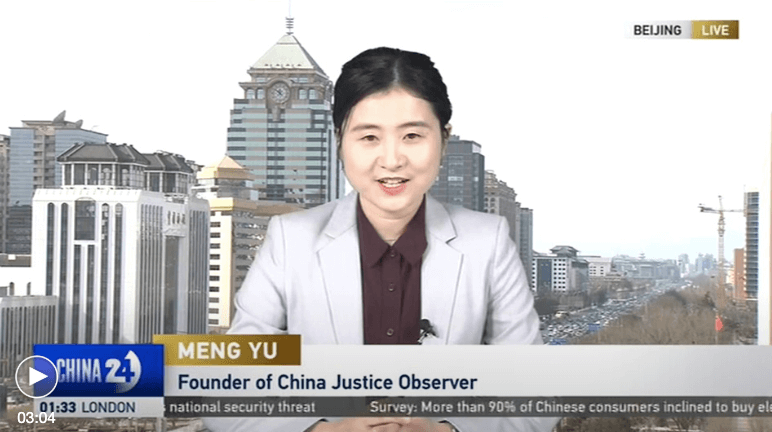On 6 Dec. 2019, Dr. Meng Yu, founder of China Justice Observer, did a live video interview with China Global Television Network (CGTN) on “China 24”, during which she expressed her views on China’s Internet courts.
For the interview video, click here.

Dr. Meng Yu: As I said in the interview, China’s Internet courts have already played a role in practice. According to the SPC’s newly-released white paper “Chinese Courts and Internet Judiciary”(中國法院的互聯網司法), China’s three Internet courts have processed more than 88,000 cases in total; over 91% of the cases are conducted online throughout; the court hearing time and the trial cycle are only half of the time spent in the traditional courts.
I also mentioned that there were two implications for the “Internet” of the Internet courts: first, all trial procedures of these courts are conducted on the Internet; second, these courts mainly try Internet-related cases.
As I have mentioned before, Internet courts are the technology incubator of the Chinese judiciary. More and more local courts are using the technologies of Internet courts in whole or in part. The said white paper also mentions that eleven local courts have set up Internet tribunals, which adopt similar practices of Internet courts.
In fact, Internet courts not only improve judicial efficiency, but also reduce the cost borne by the parties. As introduced in a previous post, according to the statistics of Beijing Internet Court, litigants’ travel mileage was thus reduced by 29.87 million kilometers and the carbon emissions were reduced by 161 tons. On average, each litigant saved CNY 800 in case expenditure and 16 hours in transit.
However, Internet courts are still exploring how to make online litigation meet the requirements of traditional litigation procedures and evidence rules. For example, how should the court handle the electronic evidence submitted by the parties online? How do Chinese judges examine electronic evidence with scant rules in this field? Will the evidence be wrongly identified or improperly analyzed? A more mature solution is needed to these questions, and Internet courts are at the forefront of exploration.
Contributors: Meng Yu 余萌









